Germany between two wars. Franco-Belgian occupation of the Ruhr
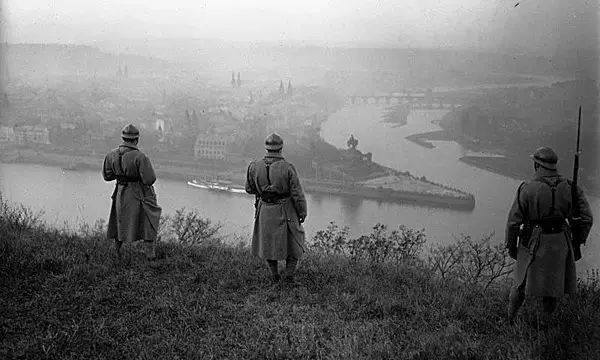
French soldiers on the banks of the Rhine
In this article, we will continue to consider one of the key problems in the development of international relations in Europe after the end of the First World War - the problem of post-war reparations in Germany and the events that followed. Considerable attention is paid to the policy of the leading European states, the reparations crisis that caused the entry of Franco-Belgian troops into the Ruhr in 1923, and the crazy inflation that followed this crisis.

Occupation of the Ruhr. French mountain troops. A Renault FT-17 tank stands nearby, 1923.
In the month of January 1923, French and Belgian troops crossed the German border and took control of many places in the Ruhr Valley of Germany. The Ruhr occupation, as it became known, would last more than two and a half years and would have a profound impact on both the politics and the economy of the Weimar Republic.

French soldiers on the streets of Essen
Occupation of the Ruhr by France and Belgium in 1923–1925 began when Germany did not fulfill its obligations to pay reparations to the victorious countries. The campaign of passive resistance interfered with the occupiers, but failed in September 1923. Both sides have incurred significant costs and have come to understand that the process of rapprochement can better serve their national interests.

French soldiers in Dortmund
This political crisis is known in stories diplomacy as the Ruhr, due to the fact that its cause was the Franco-Belgian occupation of the Ruhr.

Was the occupation justified?
There was considerable debate among diplomats about why France decided to occupy the Ruhr and whether that occupation was justified. Let's start with the backstory...
One of the key problems facing European diplomacy after the end of the First World War was the German one.

The First World War and the global economic crisis that began after it completely changed the political map of Europe. After the end of the war, the largest European empires fell, and a number of new and independent states appeared on the political map of Europe, and in some countries, under the influence of the First World War, there was even a change of ruling regimes.

Children with buckets and containers line up to receive food or drink from Belgian soldiers during the occupation of the Ruhr
The Treaty of Versailles, imposed on June 28, 1919 on Germany defeated in the First World War, was an unjust and predatory treaty. The treaties signed with the former military allies of Germany: Austria, Hungary, Bulgaria and Turkey, which together amounted to the so-called. Versailles contractual system in post-war Europe.

The French occupy Essen
Germany was declared the only culprit in unleashing the war, which was obliged to pay colossal reparations to the victorious countries, the volume of which, determined in May 1921 at the London Conference, amounted to 132 billion gold marks, of which 52% of this amount payable was to be received by France ( payment was to be made over 37 years).

French military police on bicycles occupying Essen
And on this basis, compliance with all the conditions of the Treaty of Versailles, that is, the relations of the victorious powers, primarily France and England, with Germany, became the determining factor in the development of international relations in post-war Europe.

Trains deliver cargo as an in-kind reparation payment
And along with the problem of containing Germany, the most acute issue in Franco-Anglo-German relations was the issue of Germany's payment of reparations, which caused an unprecedented political crisis that erupted in post-war Europe in January-November 1923.
The beginning of conflict
In 1922, due to the difficult economic situation in Germany, the Allies abandoned monetary reparations and replaced them mainly with commodity deliveries - steel, timber, coal and others (the so-called "program of productive pledges").

Caricature of Germany's exorbitant reparations
On September 26, 1922, a special commission of the victorious countries on issues of reparations recorded the fact that Germany had delayed the timing of reparation deliveries. When in January 1923 the interstate commission for reparations announced that the Weimar Republic was deliberately delaying goods deliveries, the government of R. Poincaré (1860–1934) cleverly used this as an excuse to send its troops into the Ruhr region, the industrial region of the Ruhr river valley.

Raymond Poincaré Prime Minister of France
The Ruhr region was the main industrial region of the Weimar Republic, located near the border with France, and the location of many coal deposits, the heart of the entire German industry, where more than 90% of coal, 40% of tin, 45% of zinc ore were mined, and smelted in metallurgical plants more than 40% steel and 75% cast iron. In addition, about 10% of the German population lived in this territory, of which 6,8 million were German industrial workers.

Rhenish-Westphalian coal syndicate
Understandably, this was a region vital to all German industrial production and therefore to its ability to pay reparations to the victorious countries.

The invasion of the Franco-Belgian troops in the Ruhr area
The government of the Weimar Republic could not respond militarily to the invasion of the French and Belgian troops and their takeover of the entire Ruhr Valley under their complete control, since its armed forces were too weakened by the articles of the Treaty of Versailles, so it ordered the workers to resist the occupation using passive resistance methods. The population of Pypa was forbidden by the government to pay taxes and carry out any of the orders of the occupying authorities.

Ironworks in the Ruhr
Note. There is a generally accepted view that France was reluctant to send troops to the Ruhr because the Weimar government failed to meet the terms of the Treaty of Versailles to meet its reparations obligations. There is also some other evidence that French Prime Minister R. Poincaré and his government planned to occupy the Ruhr as early as 1919. The fact is that France had its own significant war debts, and by 1923 she was experiencing an acute shortage of industrial resources, especially coal.

Workers at a steel plant in Essen
Passive and active resistance
In response to the entry of the Franco-Belgian troops, the workers and employees of the Ruhr went on strike and refused to help the French occupiers. The French disapproved of the strikes and proceeded to immediately arrest all those who did not help the occupation. In the end, the French began to attract French workers, ordered by the military administration from France, to work in the industrial and mining enterprises of the Ruhr.
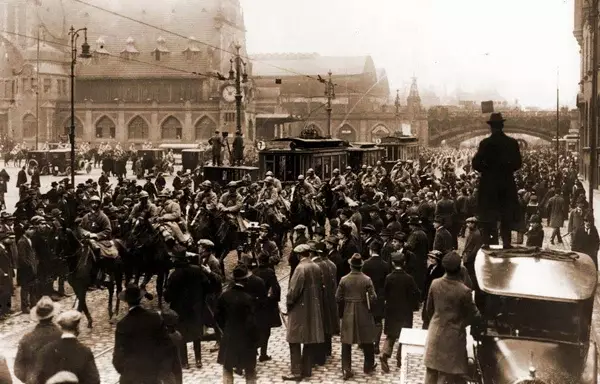
The entry of the French cavalry into Essen
After the Franco-Belgian occupation of the Ruhr Valley in Germany, the economic crisis begins to sharply worsen. Coal mining and metal smelting during this year begins to decline significantly (by about 50%), and the wages of workers in industrial enterprises are falling sharply. In general, the occupation of the Ruhr created huge problems for the economy of the Weimar Republic - most of the country's raw materials were located there, and now it was under the complete control of the occupying authorities.
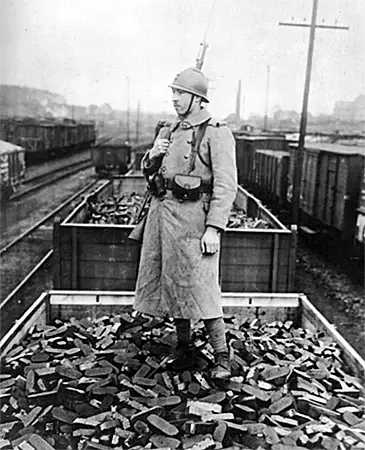
French soldier guarding coal briquettes
The concept of “passive resistance” adopted by the government of the Weimar Republic involved a complete halt in all reparation payments, while the administrative departments and industrial enterprises of the Ruhr pointedly refused to obey the demands of the occupying authorities and openly supported general strikes.
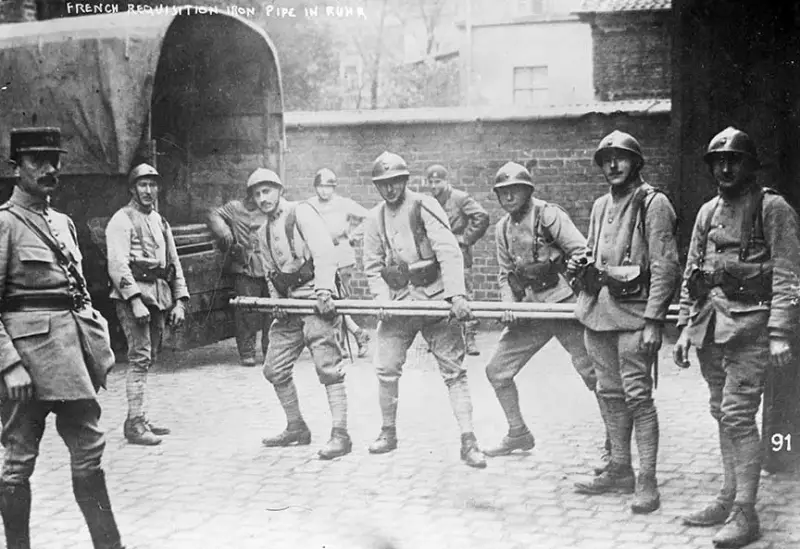
French soldiers loading seized rolled metal
Resistance in the region began to grow rapidly - from strikes of workers and employees, it has already begun to grow into voluntary paramilitary groups, arranging acts of sabotage on transport and attacking French and Belgian soldiers. It will be interesting to mention that the so-called "passive resistance" to the invaders was expressed even in linguistics - all words borrowed from the French language were then replaced by German synonyms.

Inspection of the barge on the Rhine-Herne canal. February 3, 1923
The official position of the Weimar government regarding the occupation of the Ruhr was "passive resistance". Behind the scenes, however, government agents urged unions to organize a general strike in the Ruhr, freeze industrial production, and prevent French confiscation of resources. But this policy only prolonged the French occupation and undermined the national economy.
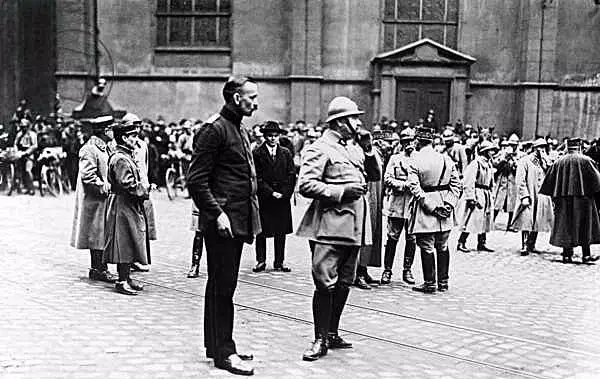
French and Belgian troops on the streets of Essen
As soon as the French and Belgian troops crossed the border, they immediately isolated the Ruhr from the rest of Germany.

First requisition of coal as reparations at the Westerholt coking plant
By July, the occupying authorities had established a no-go zone and restricted entry and exit from the Ruhr. The Franco-Belgian military administration began to confiscate raw materials and industrial goods, which were loaded into railway cars for shipment to France and Belgium as payment for missed reparation payments in kind, and the commander of the occupying forces, General Jean-Marie-Joseph Degutte (1866–1938), banned the export of coal from the Ruhr region to Germany.

A wave of fury began to rise throughout Germany, and reports were published in the press, most of which may even have been exaggerated, if not completely invented, about French soldiers executing or beating German civilians in the Ruhr. The nationalist German newspaper Deutsche Allgemeine Zeitung wrote at the time:

What the Deutsche Allgemeine Zeitung wrote about just recently soon became a reality. A desperate group of German nationalists began active preparations to infiltrate the Ruhr Valley with the intention of committing acts of sabotage and destruction of French equipment. They derailed supply trains for French units, contaminated food supplies, and committed other acts of petty sabotage.

French troops in the streets of the Ruhr
One of the famous saboteurs was Albert Schlageter, a 29-year-old young man who had previously participated in the First World War, and after its end - in the volunteer corps (Freikorps). Schlageter was caught red-handed by French soldiers trying to plant explosives on a railway line after one of his "friends" betrayed him for a reward. Albert Schlageter was arrested, court-martialed and sentenced to death by the French on the Holzheim (Holzheim) Heath on May 26, 1923.

Albert Schlageter
Later, having come to power, the National Socialists glorified Schlageter as a national hero of Germany, who fought against French aggression, and made a martyr and patriot out of him. And the man who betrayed Schlageter to the French was tracked down and killed by a gang led by Rudolf Höss (the future commandant of the infamous Auschwitz death camp).

Funeral procession of French officers in Gelsenkirchen-Buer
Hyperinflation
As a result of cash payments for striking workers, the German national treasury was almost empty, and cash reserves were no longer enough. The government's last resort to pay these salaries was to order additional banknotes to be printed, which contributed to the rampant hyperinflation of 1923.

Queue to the grocery store
The enterprises of the Ruhr, which were stopped due to strikes, enjoyed significant subsidies from the state and, in the form of compensation for "passive resistance", received money from the government to pay the wages of miners and metallurgists. Due to the printing press turned on at full power, in July 1923 the gold mark was worth 262 thousand paper marks, and on November 5 it was already 100 billion paper marks. In total, by the end of the year, there were 93 trillion paper marks in circulation!

The passive resistance of the German workers completely paralyzed the economy of the Ruhr and hastened the collapse of the German currency. And as more and more unsecured banknotes began to enter the circulation of money, the purchasing power of each Reichsmark decreased, which prompted merchants to raise prices.

During the Ruhr crisis, the suitcase became a purse for the Germans...
In 1918, a loaf of bread cost 1/4 Reichsmark. By 1922, the price had increased to three Reichsmarks. In 1923, the market price of bread had already risen to 700 Reichsmarks in January, to 1 Reichsmarks in May, by September the price of bread had already reached two million, and by November it was close to 200 billion Reichsmarks.

A cart full of Reichsmarks is also a wallet...
The Weimar government was neither strong nor authoritative enough to fix wages or prices, so its only response was to issue more paper money.
The denomination of issued banknotes increased - the largest banknote had 100 trillion Reichsmarks. In just one day, October 25, 1923, the government of the Weimar Republic issued banknotes with a nominal value of 120 trillion Reichsmarks (!), while announcing plans to triple their daily output. And by November, the Ministry of Finance reported that 000 Reichsmarks were in circulation in Germany!

The boys fly a kite glued from banknotes
The purchasing power of paper money was disappearing so quickly that some companies paid workers in the morning so they could hurry up and spend their wages at lunchtime. Wives waited at the factories for their husbands on payday to rush to the shops and spend the money as quickly as possible.
There were also such oddities: when one man ordered coffee in a restaurant, only to find that its price had doubled by the time the coffee was delivered to his table.

Woman melting the oven with banknotes
It was not uncommon to see shoppers on the streets of German cities carrying buckets, bags, and even carts full of banknotes, while children on the streets played with useless banknotes as toys, and their mothers used the money to light stoves and boilers, level cake molds and even as wallpaper.

German children play with banknotes
If we talk about curiosities, then here's another one: a woman dragged a suitcase with banknotes to a local grocery store and, when she briefly left it outside, someone stole the suitcase itself, while pouring unnecessary money out of it into the street.

Such crazy hyperinflation made foreign exchange almost impossible and, as a result, German corporations could not transact or trade abroad. Unable to acquire gold or foreign currency, the government of the Weimar Republic was also unable to pay reparation payments. There is an opinion that the government deliberately weakened the German economy in protest against the payment of reparations to the allies, although there is no direct evidence of this.

German children play with banknotes
But there were also those who benefited from hyperinflation - these are citizens with large debts, since they could be easily repaid, and some smart businessmen who took out loans at the beginning of inflation to buy real estate, and then repaid the loan weeks or months later with almost worthless money. .

The crisis caused the collapse of two cabinets (W. Cuno and G. Stresemann) as the ministers argued over how best to end the crisis. The final decision was proposed by the newly appointed Finance Minister Hans Luther.

Reich Chancellor Gustav Stresemann (left) and Wilhelm Kuno (right)
In October, by Luther's decision, a new reserve bank (Rentenbank) was formed and a new currency (rent mark) was created. The value of this new annuity was firmly pegged to the value of gold, although it could not be exchanged for gold because the government had no gold reserves. One REM was originally valued at one billion "Old" Reichsmarks, while foreign currency was pegged at 4,2 REM per US dollar.

Finance Minister Hans Luther
In an effort to quickly say goodbye to hyperinflation, the public of the Weimar Republic adopted a new currency, which allowed prices and wages to be gradually normalized.
UK position
All the leading political forces in Britain - conservatives, liberals and some Laborites - understood that Germany was the economic core of all of Europe, and its enslavement into a reparation cage would only lead to a catastrophe for the economy of the entire European community, so they recognized the need for the speedy restoration of political balance in Europe and the transition to a policy of appeasement.

French soldiers patrol the streets
Since the signing of the Treaty of Versailles in 1919, relations between Britain and the Weimar Republic have gradually moved towards warming, while relations between Britain and France have steadily deteriorated for a number of reasons: between them the most acutely felt contradictions on issues of leadership in Europe.
The British ambassador in Berlin, Edgar Vincent d'Abernon (1857–1941), expressed the view of the British government in the following words:

Ambassador to Germany Edgar Vincent d'Abernon
But even despite Britain's declared neutrality in this conflict, the British ambassador, already in the very first days of the crisis, was secretly negotiating with Germany for unconditional support in the event of a protracted conflict, and he partially provoked the development of events and the transition of British policy from neutrality to open intervention and economic pressure on France.

The contradictions on the question of the Franco-Belgian occupation of the Ruhr became more and more aggravated. In diplomatic circles, they have already begun to talk about a serious discord in the existing Versailles system and even about the collapse of the existing Franco-British alliance. Speaking in August 1923 at a special meeting of the British House of Commons on the question of reparations, the recently elected from the Conservative Party, Prime Minister S. Baldwin, declared that he was striving with all his might to eliminate the Ruhr conflict as an ardent friend of France.
The position of the Soviet Union
While Downing Street was playing its double game under the rug, the Soviet government was seriously concerned about the current situation in this European region. The Soviet People's Commissariat of Foreign Affairs stated that a further escalation of tension in the Ruhr could provoke a new war in Europe, and the Soviet government blamed both the aggressive policy of R. Poincaré's cabinet and the provocative actions of the government of the Weimar Republic for this ever-increasing conflict.

Soviet workers
The Soviet trade unions, who decided to provide financial support to the Ruhr workers in the amount of 100 thousand gold rubles and send 160 wagons of grain to Germany, did not remain indifferent to the problem of the striking workers of the Ruhr.
This is how the participants in the Congress of Workers of the Rhine-Ruhr Industrial Region responded to the fraternal assistance of the USSR.
Italy's position
Using the conflict in the Ruhr Valley, the Italian government was in a hurry to arrange its affairs in the Mediterranean region. B. Mussolini, who recently came to power, presented Italy with claims to the entire eastern coast of the Adriatic Sea, putting forward the slogan of turning the entire Adriatic into the Italian inland sea (Mare nostro) and incorporating a significant part of the Yugoslav kingdom into the resurgent Italian Empire.

Italian troops on the island of Corfu, 1923
Taking advantage of the situation when the European powers were preoccupied with the Ruhr crisis, the Italians even occupied the Greek island of Corfu for a while. The reason was the murder in August 1923 on the Greek territory of the Italian border delegation, which prompted B. Mussolini to order the bombardment of Corfu from the sea.
After Greece appealed to the League of Nations, and Britain, which, for strategic reasons, could not allow the capture of the island of Corfu, the Italians were ordered to evacuate in an ultimatum form, but Greece was forced to pay an indemnity to Italy.
Dawes plan. Solution

Charles Gates Dawes
After the occupation of the Ruhr region by the Franco-Belgian troops and the introduction of a military occupation administration on its territory, another coup attempt took place in the Weimar Republic (Beer putsch in Bavaria). After that, the United States and Great Britain decided to remove France from resolving the German issue, taking advantage of its financial dependence on them.
In late 1923, when the victorious powers were deadlocked over the payment of reparations in discussing the German question, the Reparations Commission formed a special committee to deal with the situation. Led by Charles J. Dawes (Chicago banker and future Vice President of the United States), the committee presented its proposal in April 1924 to settle reparations payments.
1. Economic policy in Berlin will be reorganized under foreign control.
2. A new currency, the Reichsmark, will be adopted.
3. France and Belgium are evacuated from the Ruhr.
4. Foreign banks will lend the German government $200 million to help economic stabilization.
5. Over the next four years, US banks would lend Germany enough money to enable it to repay reparation payments to countries such as France and Britain.
6. These countries, in turn, use reparation payments received from Germany to service their war debts to the United States.

Reparations Commission
Even though France succeeded in successfully carrying out its occupation of the Ruhr, the Weimar Republic, through its passive resistance in the Ruhr and the resulting hyperinflation, which destroyed the German economy, still won sympathy in the world, and under strong financial pressure from the United States and Great Britain, the French government was compelled to agree with the Dawes plan.

Arrival of the first American gold in Germany under the Dawes Plan
In 1925, Dawes received the Nobel Peace Prize in recognition of his plan's contribution to resolving the reparations crisis.
In Germany, the presented "Dawes Plan" was accepted with great enthusiasm, since politically it gave the German side a very serious instrument of pressure on England and France in the matter of gradually weakening the "fetters of Versailles" and restoring the country to the status of a full-fledged European power.
The Ruhr Crisis is over...
Information